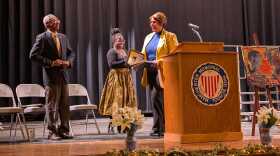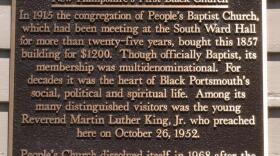New Hampshire was the last state in the nation to establish Martin Luther King Jr. Day.
Former state representative Harvey Keye fought for the state to attach King's name to the holiday -- a battle that lasted for decades. It ended in 1999, with Keye sharing with his fellow lawmakers about growing up in Birmingham, Alabama under segregation and Jim Crow laws.
Keye is a Korean War veteran and a civil rights activist who marched with Dr. King in Birmingham in 1963. NHPR's Morning Edition Host Rick Ganley went to visit with him at his home in Nashua to hear his story.
Thank you so much for having us in your home today and talking with us. I want to ask you a little bit, if you could tell me about the first time that you met Dr. King. Where were you and what were the circumstances?
Well, the first time I met him, I was [in] Atlanta [at] university doing graduate work in biology. I got a job, part time job, because I was in school, needed the money, at the Henderson Travel Agency. And this one day, Martin Luther King, [Fred] Shuttlesworth and some of those other preachers came over to get a ticket. You know, it was Martin Luther King, but, you know, he didn't have this notoriety. He didn't have the popularity that he [had] later on and what have you. He wasn't in the marches. They were just going to India to meet Gandhi and talk about how to do this stuff. And I met him there, made the tickets out, and Mrs. Henderson okayed it. They took off. That was my first time.
So not too much of an impression at that point. You're a young man just trying to get through school, trying to make your way and need the job. I'm wondering, how did he affect you as the years went on?
He had come to Birmingham to meet with some of the ministers to talk about a march, I guess. The only place that they could meet was at A.G. Gaston Motel, which was a colored motel, Negro motel, only place that colored people or Negro people could live in Birmingham in public facilities. And he and his fellows had come there in the evening to have a conference. So me and a few fellows were there having a beer. And lo and behold, a hole blew through the wall. And I –
What happened? What was that from?
Well, we think it was white supremacists, some racists who threw some kind of bomb against the wall and blew the cinder blocks out. So me and my boys were carrying guns, because after the war I carried a gun. And we were gonna go and find somebody and shoot them. That's what we thought. But Martin Luther King at that time say, hey, this is not the way you do it. So we stopped and they chatted with us about nonviolence and how to get through this society alive by being nonviolent. That impressed me. I put the gun away forever. And I haven't carried a one again.
I'm struck by that for many reasons. You're young man, young veteran, coming back from the Korean War, discrimination no better after fighting for your own nation, your own country. Obviously, there has to be anger there. I can't imagine that there wouldn't be. And how you were able to set that aside and how he was able to reach you and to change your thought process.
But, you know, I didn't have a purpose at that time except killing somebody. I couldn't vote. Having come back as an honorably discharged veteran, I went to the courthouse to vote and a guy says, if you want to vote, you count the number of beads in this jar. And I said, I'll break your neck. And he said, I'll shoot you and nothing will be done about it. In Birmingham, segregation was the law of the land. All of the liquor stores, for instance, if there were one liquor store, one side was white and one was colored. In the department stores, there were restrooms for whites and none for coloreds, water fountains for whites and a water fountain and for colored. So those were the times when Martin Luther King was beginning to organize.
How do you observe Martin Luther King Jr. Day? What are you thinking about?
I'm going to church. I'm going to listen to whatever they say and do, and try to treat everybody as human beings and try to make sure that I forgive everybody who has been ugly to me. Forgive them. Forgive them. And as Martin Luther King says, give, serve all that you can with the extreme humility and you'll become powerful. I got that kind of stuff from him.







